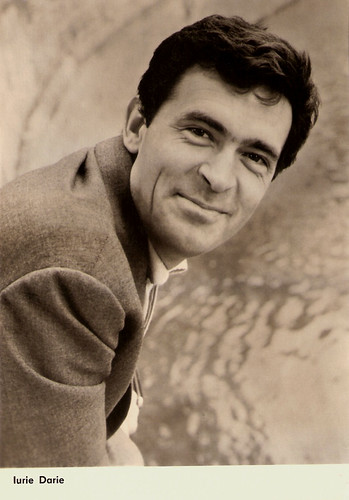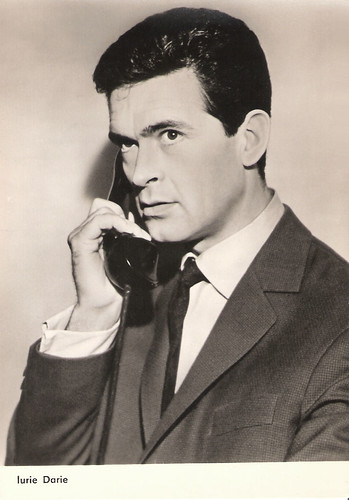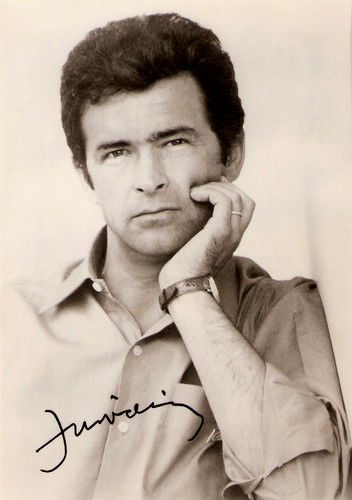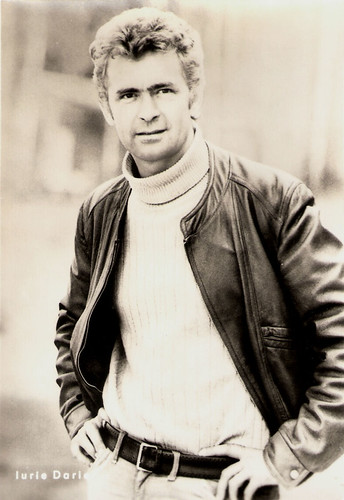Romanian actor Iurie Darie (1929-2012) passed away on the night of 9 November 2012 surrounded by his family. He played since 1953 in over 40 film productions. He was one of the most popular stars of the East European cinema of the 1960s and 1970s. During his last years, he suffered from diverse health problems including respiratory and cardiac insufficiency and also a stroke.

East-German postcard by VEB Progress Film-Vertrieb, Berlin, no. 2703, 1966. Retail price: 0,20 M. Photo: Balinski.

East-German postcard by VEB Progress Film-Vertrieb, Berlin, no. 2708, 1966. Retail price: 0,20 M. Photo: Balinski.
In 1929 Iurie Darie was born as Iurie Darie-Maximciuc in Vadul Rașcov (Vadul Rosu), Romania, in what is now Moldova. The young Darie showed a talent for drawing, but also for acting. So he applied at both the Institutul de Arte Plastice (Institute of Fine Arts) and at the Institutul de Artă Teatrală și Cinematografică (IATC - Institute of Theater and Cinematographic Art) in Bucharest. He succeeded at both but chose for the latter, where he graduated in 1952.
His teachers were the actors Mihai Popescu and Marietta Sadova. He made his film debut in Nepoții gornistului/The Bugler's Grandsons (Dinu Negreanu, 1953) with Marga Barbu. More than 40 films and many TV productions would follow.
Among his memorable early films are Directorul nostrum/Our Director (Jean Georgescu, 1955) with Radu Beligan, the action film Alarma in munti/Alarm in the Mountains (Dinu Negreanu, 1955) with Liviu Ciulei, the comedy Alo? Ati gresit numarul/Hello? Wrong Number (Andrei Calarasu, 1958) with Sandru Radulescu, and the soccer comedy Băieții noștri/Our Lads (Anastasia Anghel, Gheorghe Vitanidis, 1959). These films are unknown in the rest of the world, but they were popular in Romania and are still well-liked, as the ratings at IMDb show.
Durie steadily filmed on. He appeared in popular comedies such as Post Restant/Post Restante (Gheorghe Vitanidis, 1961) with Coca Andronescu, Vacanță la mare/Seaside Vacation (Andrei Calarasu, 1962), and Dragoste la zero grade/Love at zero degrees (Cezar Grigoriu, Geo Saizescu, 1964). In the fantasy Faust XX (Ion Popescu-Gopo, 1966) he played Faust’s (Emil Botte) young assistant who has to fight both Mefistoteles (Jorj Voicu) and the beautiful she-devil Marguerite (Ewa Krzyzewska).
He reunited with Marga Barbu for the drama Procesul alb/White Trial (Iulian Mihu, 1965). In 1969 he made the film Rautaciosul adolescent/A Woman for a Season (Gheorghe Vitanidis, 1969) with Irina Petrescu. That year director Mircea Dragan chose him to play in the popular comedy film series Brigada Diverse/Brigade Miscellaneous (1970) and its sequels, all starring Toma Caragiu.

East-German postcard by VEB Progress Film-Vertrieb, Berlin, no. 2191. 1964. Retail price: 0,20 DM.

East-German postcard by VEB Progress Film-Vertrieb, Berlin, no. 249/70. 1970. Retail price: 0,20 M. Photo: Balinski.
In East Germany, Iurie Darie appeared for the DEFA in the disastrous Sci-Fi film Signale - Ein Weltraumabenteuer/Signals: A Space Adventure (Gottfried Kolditz, 1970) with Gojko Mitić, and again with Mitić in the Western Osceola (Konrad Petzold, 1971).
During the 1970s, Darie’s films include the war drama Atunci i-am codamnat pe toți la moarte/Ipu’s death (Sergiu Nicolaescu, 1971), the historical drama Cantemir (Gheorghe Vitanidis, 1973) with Alexandru Repan, Frații Jderi/The Captain Martens Brothers (Mircea Dragan, 1973), and the historical drama Stefan cel Mare/Stephen the Great (Mircea Dragan, 1974).
Then followed two more DEFA Westerns with Gojko Mitić, Blutsbrüder/Blood Brothers (Werner W. Wallroth, 1975) with the America-imported star Dean Reed, and Severino (Claus Dobberke, 1978). Also interesting was the war film Am fost 16/There Were 16 of Us (Mircea George Cornea, 1979).
During the winter of 1944, the Romanian army was struggling to capture Budapest from the Nazis. The film tells the story of a platoon whose mission was to keep a strong point in the centre of Budapest. After the war, the entire merit of capturing Budapest went to the Soviets, but, in fact, they entered the city only after the Romanians assured the objectives. Therefore the film was regarded as ‘politically incorrect’ in communist Romania soon after it hit the screen.
During the following decades, Iurie Darie continued to perform in the Romanian cinema, mostly in supporting parts. Among these later films are the action thriller Revansa/Revenge (Sergiu Nicolaescu, 1980), another action film Drumul oaselor/The Road of Bones (Doru Nastase, 1982) with Florin Piersic, Ringul/Ring (Sergiu Nicolaescu, 1983), Cale Libera/A Day in Bucharest (Nicy Stan, 1986), and the musical In fiecare zi mi-e dor de tine/You Are Always in My Heart (Gheorghe Vitanidis, 1987), and the actioner Triunghiul mortii/Triangle of Death (Sergiu Nicolaescu, 1999). In 2004 she starred in the television series Numai iubirea/Only Love (Iura Luncasu, Paul Sorin Damian, 2004).

Big East German card by VEB Progress Film-Vertrieb, Berlin, no. 185/71, 1971. Retail price: 0,50 M. Photo: Schwarz.

East German postcard by VEB Progress Film-Vertrieb, Berlin, no. 181/72. 1972. Retail price: 0,20 M. Photo: Schwarz.
An important period of Iurie Darie’s career was his stay at the Teatrului de Comedie (Comedy Theatre), where Radu Beligan had gathered some great Romanian actors, including Gheorghe Dinică, Marin Moraru and Mircea Albulescu, who would make this theatre famous. Darie played here under the direction of Lucian Giurchescu and later under David Esrig. Among his most noted performances are his roles in 'Troilus and Cressida' and 'Umbra' (Shadow).
After the Revolution, he starred for the Comedy Theatre in such productions as 'Pălăria' (Hat), directed by Horațiu Mălăele (1998), and 'Patru pe o canapea și valetul' (Four on a couch and jack) written by Marc Camoletti and directed by Radu Nichifor (2000).
The actor also worked with Bessarabia filmmakers on the children’s film Moara/Mill (1992). For the National Theatre Mihai Eminescu in Chisinau, he played in 'Father' (1999-2000). Before the revolution, Darie had shown his notable skill for drawing in children’s programmes for TV. He even sometimes drew with both hands. He toured the country with educational and funny shows in which he told and drew stories.
Darie illustrated two books and he released a CD with music performed by him. He married twice. His first wife, Consuela Rosu died prematurely. They had a son Alexandruu Darie, who is now the director of the prestigious Teatru Bulandra in Bucharest.
In 2010, the then 81-year-old Darie and his second wife, actress Anca Pandrea, aged 64, shocked the nation when they confessed to the newspaper The National that they would like to play together in a porn movie. There was a sexy photo shoot to prove it. During his final years, Iurie Datie suffered from diverse health problems including respiratory and cardiac insufficiency and also a stroke.
Musical scene from Dragoste la zero grade/Love at zero degrees (Cezar Grigoriu, Geo Saizescu, 1964) with Dem Radulescu, Iurie Darie, and Coca Andronescu. Source: Publisite (YouTube).
Sources: Wikipedia (Romanian and English), and IMDb.
This post was last updated on 28 November 2023.

East-German postcard by VEB Progress Film-Vertrieb, Berlin, no. 2703, 1966. Retail price: 0,20 M. Photo: Balinski.

East-German postcard by VEB Progress Film-Vertrieb, Berlin, no. 2708, 1966. Retail price: 0,20 M. Photo: Balinski.
Popular comedies
In 1929 Iurie Darie was born as Iurie Darie-Maximciuc in Vadul Rașcov (Vadul Rosu), Romania, in what is now Moldova. The young Darie showed a talent for drawing, but also for acting. So he applied at both the Institutul de Arte Plastice (Institute of Fine Arts) and at the Institutul de Artă Teatrală și Cinematografică (IATC - Institute of Theater and Cinematographic Art) in Bucharest. He succeeded at both but chose for the latter, where he graduated in 1952.
His teachers were the actors Mihai Popescu and Marietta Sadova. He made his film debut in Nepoții gornistului/The Bugler's Grandsons (Dinu Negreanu, 1953) with Marga Barbu. More than 40 films and many TV productions would follow.
Among his memorable early films are Directorul nostrum/Our Director (Jean Georgescu, 1955) with Radu Beligan, the action film Alarma in munti/Alarm in the Mountains (Dinu Negreanu, 1955) with Liviu Ciulei, the comedy Alo? Ati gresit numarul/Hello? Wrong Number (Andrei Calarasu, 1958) with Sandru Radulescu, and the soccer comedy Băieții noștri/Our Lads (Anastasia Anghel, Gheorghe Vitanidis, 1959). These films are unknown in the rest of the world, but they were popular in Romania and are still well-liked, as the ratings at IMDb show.
Durie steadily filmed on. He appeared in popular comedies such as Post Restant/Post Restante (Gheorghe Vitanidis, 1961) with Coca Andronescu, Vacanță la mare/Seaside Vacation (Andrei Calarasu, 1962), and Dragoste la zero grade/Love at zero degrees (Cezar Grigoriu, Geo Saizescu, 1964). In the fantasy Faust XX (Ion Popescu-Gopo, 1966) he played Faust’s (Emil Botte) young assistant who has to fight both Mefistoteles (Jorj Voicu) and the beautiful she-devil Marguerite (Ewa Krzyzewska).
He reunited with Marga Barbu for the drama Procesul alb/White Trial (Iulian Mihu, 1965). In 1969 he made the film Rautaciosul adolescent/A Woman for a Season (Gheorghe Vitanidis, 1969) with Irina Petrescu. That year director Mircea Dragan chose him to play in the popular comedy film series Brigada Diverse/Brigade Miscellaneous (1970) and its sequels, all starring Toma Caragiu.

East-German postcard by VEB Progress Film-Vertrieb, Berlin, no. 2191. 1964. Retail price: 0,20 DM.

East-German postcard by VEB Progress Film-Vertrieb, Berlin, no. 249/70. 1970. Retail price: 0,20 M. Photo: Balinski.
Disastrous Sci-Fi film
In East Germany, Iurie Darie appeared for the DEFA in the disastrous Sci-Fi film Signale - Ein Weltraumabenteuer/Signals: A Space Adventure (Gottfried Kolditz, 1970) with Gojko Mitić, and again with Mitić in the Western Osceola (Konrad Petzold, 1971).
During the 1970s, Darie’s films include the war drama Atunci i-am codamnat pe toți la moarte/Ipu’s death (Sergiu Nicolaescu, 1971), the historical drama Cantemir (Gheorghe Vitanidis, 1973) with Alexandru Repan, Frații Jderi/The Captain Martens Brothers (Mircea Dragan, 1973), and the historical drama Stefan cel Mare/Stephen the Great (Mircea Dragan, 1974).
Then followed two more DEFA Westerns with Gojko Mitić, Blutsbrüder/Blood Brothers (Werner W. Wallroth, 1975) with the America-imported star Dean Reed, and Severino (Claus Dobberke, 1978). Also interesting was the war film Am fost 16/There Were 16 of Us (Mircea George Cornea, 1979).
During the winter of 1944, the Romanian army was struggling to capture Budapest from the Nazis. The film tells the story of a platoon whose mission was to keep a strong point in the centre of Budapest. After the war, the entire merit of capturing Budapest went to the Soviets, but, in fact, they entered the city only after the Romanians assured the objectives. Therefore the film was regarded as ‘politically incorrect’ in communist Romania soon after it hit the screen.
During the following decades, Iurie Darie continued to perform in the Romanian cinema, mostly in supporting parts. Among these later films are the action thriller Revansa/Revenge (Sergiu Nicolaescu, 1980), another action film Drumul oaselor/The Road of Bones (Doru Nastase, 1982) with Florin Piersic, Ringul/Ring (Sergiu Nicolaescu, 1983), Cale Libera/A Day in Bucharest (Nicy Stan, 1986), and the musical In fiecare zi mi-e dor de tine/You Are Always in My Heart (Gheorghe Vitanidis, 1987), and the actioner Triunghiul mortii/Triangle of Death (Sergiu Nicolaescu, 1999). In 2004 she starred in the television series Numai iubirea/Only Love (Iura Luncasu, Paul Sorin Damian, 2004).

Big East German card by VEB Progress Film-Vertrieb, Berlin, no. 185/71, 1971. Retail price: 0,50 M. Photo: Schwarz.

East German postcard by VEB Progress Film-Vertrieb, Berlin, no. 181/72. 1972. Retail price: 0,20 M. Photo: Schwarz.
Porn movie
An important period of Iurie Darie’s career was his stay at the Teatrului de Comedie (Comedy Theatre), where Radu Beligan had gathered some great Romanian actors, including Gheorghe Dinică, Marin Moraru and Mircea Albulescu, who would make this theatre famous. Darie played here under the direction of Lucian Giurchescu and later under David Esrig. Among his most noted performances are his roles in 'Troilus and Cressida' and 'Umbra' (Shadow).
After the Revolution, he starred for the Comedy Theatre in such productions as 'Pălăria' (Hat), directed by Horațiu Mălăele (1998), and 'Patru pe o canapea și valetul' (Four on a couch and jack) written by Marc Camoletti and directed by Radu Nichifor (2000).
The actor also worked with Bessarabia filmmakers on the children’s film Moara/Mill (1992). For the National Theatre Mihai Eminescu in Chisinau, he played in 'Father' (1999-2000). Before the revolution, Darie had shown his notable skill for drawing in children’s programmes for TV. He even sometimes drew with both hands. He toured the country with educational and funny shows in which he told and drew stories.
Darie illustrated two books and he released a CD with music performed by him. He married twice. His first wife, Consuela Rosu died prematurely. They had a son Alexandruu Darie, who is now the director of the prestigious Teatru Bulandra in Bucharest.
In 2010, the then 81-year-old Darie and his second wife, actress Anca Pandrea, aged 64, shocked the nation when they confessed to the newspaper The National that they would like to play together in a porn movie. There was a sexy photo shoot to prove it. During his final years, Iurie Datie suffered from diverse health problems including respiratory and cardiac insufficiency and also a stroke.
Musical scene from Dragoste la zero grade/Love at zero degrees (Cezar Grigoriu, Geo Saizescu, 1964) with Dem Radulescu, Iurie Darie, and Coca Andronescu. Source: Publisite (YouTube).
Sources: Wikipedia (Romanian and English), and IMDb.
This post was last updated on 28 November 2023.
No comments:
Post a Comment